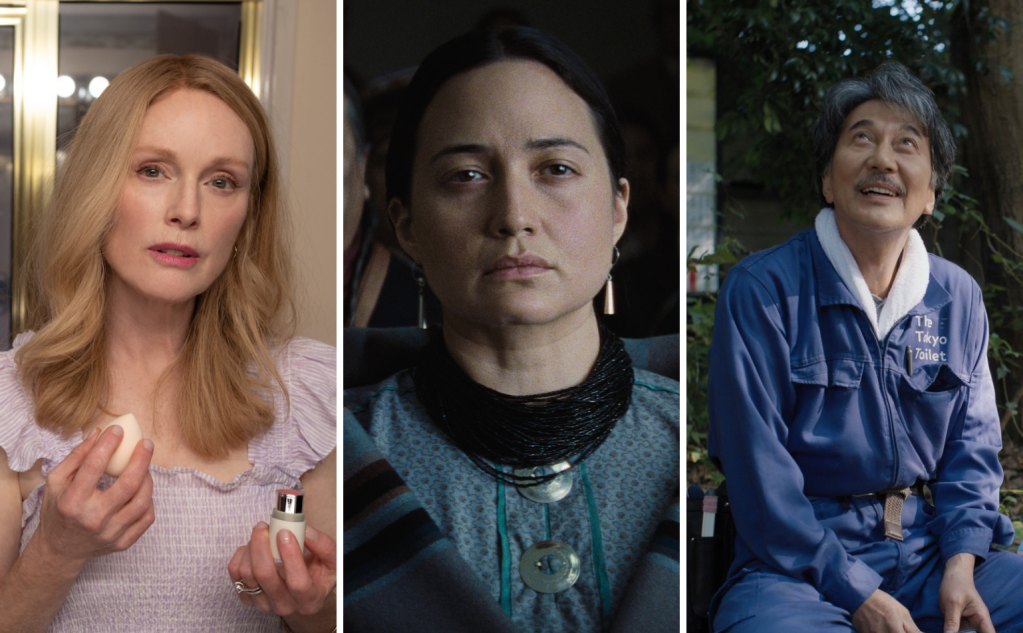
With the Barbenheimer phenomenon, new movies from masters like Martin Scorsese and Hayao Miyazaki, and less reliance on comic book IP, movies were back in the cultural conversation for the first time since Avengers: Endgame. It didn’t hurt that you could craft a top 20 as strong as most year’s top tens, either.
Before we get to the list, here are nine runners-up (in alphabetical order): All of Us Strangers; Anatomy of a Fall; Asteroid City; Beau Is Afraid; The Boy and the Heron; The Iron Claw; The Killer; Mission: Impossible – Dead Reckoning Part One; Theater Camp
10. The Wonderful Story of Henry Sugar: The somehow underappreciated* Wes Anderson released one of the year’s best features in Asteroid City and followed it with four whimsical shorts based on Roald Dahl works. The best of the bunch was the 39-minute Henry Sugar, the edifying story of a man who stole a fortune just so he could give it away.
* = Anderson is a slight favorite to win his first Oscar this weekend for this short.
9. Poor Things: While director Yorgos Lanthimos and writer Tony McNamara presented a somewhat sanitized depiction of femininity (devoid of body hair, birth control, or menstruation), Poor Things successfully pushed the envelope in an increasingly puritanical society.
8. Perfect Days: No movie was as aspirational to me as Wim Wenders’ Perfect Days. Hirayama (Koji Yakusho) is a janitor in Tokyo. He listens to cassettes, reads real, physical books, and uses a flip phone. While I’m in no jeopardy of disavowing the internet, Wenders reminds us that each day is a gift if we slow down long enough to notice.
7. Monster: I’m a sucker for multi-perspective, Rashomon-style storytelling. Recently, Gone Girl, The Last Duel, and Monster have deployed the tactic successfully. Monster’s perspectives ask challenging questions about abuse, bullying, and teaching in an age of unprecedented parental oversight before its final turn reveals a more delicate truth.
6. May December: As movies become more metatextual (reminding you that Everything Everywhere All at Once won Best Picture last year), few directors are better positioned for the future than Carol auteur Todd Haynes. Haynes’ latest, a layered character study about fame, scandal, and deception, cleverly lampoons its subjects before returning the spotlight to the viewer: Why are we so obsessed with scandal?
5. Barbie: When Lady Bird scribe Greta Gerwig announced her aspirations to direct big-budget films, I was distressed. In retrospect, if we get more blockbusters as quick-witted, considered, and imaginative as Barbie, the film industry will be stronger for it.
4. Past Lives: There’s undeniable power in the romantic what if. It’s a universal experience. Meeting someone at the wrong time can be life-altering, especially if they’re impossibly handsome.
Writer-director Celine Song managed to give each member of her love triangle genuine humanity, only adding to the heartache at the center of Past Lives.
3. The Zone of Interest: Jonathan Glazer’s impersonal look at the industry of genocide was the single most distressing viewing experience of my life.
2. Killers of the Flower Moon: For his entire career, Martin Scorsese has been trying to tell us What’s Up With America. Taxi Driver presciently previewed the white male rage that would define the next 50 years. Goodfellas showed us that violence can be a means to an end. The Wolf of Wall Street taught us that in America, everything’s for sale. Killers of the Flower Moon is an encapsulation of them all. Killers is a Native story, but more than that, it’s shorthand for the story of America.
1. Oppenheimer: I have a complicated relationship with Christopher Nolan. He’s a blockbuster technician whose filmmaking chops are only rivaled by the most accomplished directors in the film industry, those with last names like Spielberg, Scott, and Cameron. On the other hand, his filmography doesn’t have a single character as strong as E.T.’s Elliott, Gladiator’s Maximus, or Titanic’s Rose. Or, at least, it didn’t until Cillian Murphy’s J. Robert Oppenheimer.
The jingoistic fervor of the post-bomb feet-stamping immediately became the best scene of the year and Nolan’s career.
